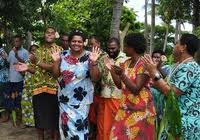 Fijian people
Fijian people
By any objective measure of the Commonwealth’s own criteria, Fiji should by now be expelled from the Commonwealth of Nations.
Since September 1, 2009, Fiji has been suspended from the Commonwealth, which means that it cannot participate in any inter-governmental meetings or in events such as the Commonwealth Games.
The decision to suspend Fiji from the Commonwealth association of 54 states followed the failure of the unelected regime of Commodore Frank Bainimarama to negotiate with the opposition and to commit to hold credible elections by October 2010.
Bainimarama deposed Fiji’s democratically elected government on 5th December 2006 in the country’s fourth coup in 20 years. Since then, he has ruled the country with an iron fist, abrogating its 1997 Constitution, imposing harsh public emergency regulations curtailing freedom of speech and assembly, violating human rights of persons targeted as dissidents, dissolving elected municipal councils, and disestablishing the Great Council of Chiefs – the umbrella body of indigenous Fijians. His regime has also presided over the economic decline of a once prosperous country. The economy performed poorly for three consecutive years from 2009 to 2011 and the IMF identified “resolution of political uncertainties” as one of the priorities to spur investment and raise the growth rate. There has also been heavy emigration of both Indo-Fijians and indigenous Fijians.
The Commonwealth has remained engaged with Fiji throughout the period of its suspension. The late Sir Paul Reeves – former Governor-General of New Zealand -- as the special representative of the Commonwealth Secretary-General, worked valiantly to promote dialogue between Bainimarama and other key political leaders. Reeves died in August 2011 having had no success. There was no interest in discussion and compromise by the ruling regime, which wanted only acceptance of its own agenda.
Bainimarama has been remarkably cunning at manipulating the international community including his largest two Commonwealth neighbours, Australia and New Zealand -- both of which have been criticized for not applying stringent sanctions that could have brought down the regime. The two largest Pacific countries have broken-off and resumed diplomatic relations with the Fijian regime in efforts to persuade it to allow the preparation of a broadly-acceptable new constitution and to hold general elections.
Early in 2011, the regime agreed to the appointment of a five-member Constitution Commission headed by the well-known Kenyan constitutional lawyer Professor Yash Ghai. But, Bainimarama was flattering to deceive. On January 10, in a TV broadcast, he dispensed with the draft constitution drawn up by the constitutional committee, and assigned his attorney general to produce a new draft by the end of the month. Just days earlier, police confiscated 600 copies of the draft constitution that had been released by Yash Ghai. There can be no more blatant a process of spurning the Commonwealth’s urging for a return to democracy and the rule of law in Fiji, including a broadly-acceptable new constitution and free and fair general elections by 2014.
Once again, Bainimarama demonstrated no interest in anything but his own agenda. In this, he is backed by his military. Nearly 50 military officers now occupy important posts in the civil service and district administrations, and the military want to retain a significant role in the country’s governance guaranteed by the constitution. Bainimarama says that elections will be held in 2014 but it seems obvious that his new Constitution, to be framed by his attorney-general, will be such that any general elections will resolve none of Fiji’s problems or hasten its return to democracy.
On January 16, the regime issued a decree dictating new and difficult requirements for political parties to be registered. Existing parties had only 28 days from January 18 to re-register. Many of the 16 existing parties will most likely be eliminated under the rules laid down by the unelected regime.
All of this has become further complicated by the interests in the region of the world’s two largest economies and rival nations – China and the United States. In 2010, in response to closer relations being developed between China and Fiji, the US announced policy of “pivot to Asia” witnessed the re-opening of a USAID office in Fiji that had been closed since 1995. Then in September 2012, China signed several investment agreements with Fiji said to be worth hundreds of millions of dollars.
Therefore, efforts by Fiji's Commonwealth neighbours in the Pacific, including the Pacific Islands Forum, to urge a return to democracy by the Fijian regime are being undermined by the clash for influence by China and the US. Of course, as countries in the Caribbean know well, when this kind of ‘cold war’ struggle ends (as it did between Russia and the US in the Caribbean), its benefits end with it. In any event, none of this resolves the fundamental problems in Fiji; it merely perpetuates them. The people of Fiji continue to endure an unelected government that has ruled, according to its own wishes, for over six years.
The Commonwealth’s record on Fiji has been commendable so far, but it should now deal firmly with the military government by again expelling the country. In 1987, the Commonwealth expelled Fiji after two military coups. Re-admitted 10 years later in 1997 after it introduced a non-discriminatory constitution, the Commonwealth suspended it again in 2000 after another coup. It was again re-admitted in 2001 until its suspension in 2009 following Bainimarama’s military coup in 2006.
Sadly, in their struggle for influence in the region, and by ignoring the unconstitutionality of the Fiji regime and its abuses, both the United States and China exert pressure on Commonwealth countries not to expel Fiji from the Commonwealth in accordance with its own rules. But, the people of Fiji deserve better, and the nine-member Commonwealth Ministerial Action Group (CMAG) should hold the people’s plight uppermost in its collective mind when it meets in April. It should also be faithful to the Commonwealth’s own principles and rules.